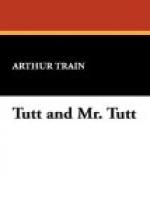“As you deem wise,” answered the judge. “Proceed then.”
Through a blur of sight and sound Mr. Hepplewhite dimly heard Mr. Tutt addressing the jury and saw them lean forward to catch his every word.
Beside him Mr. Edgerton was saying protestingly: “May I ask why you made those fool statements on the witness stand?”
“Because I didn’t want an innocent man convicted,” returned Mr. Hepplewhite tartly.
“Well, you’ll get your wish!” sniffed his lawyer. “And you’ll get soaked for about twenty thousand dollars for false arrest!”
“I don’t care,” retorted the client. “And what’s more I hope Mr. Tutt gets a substantial fee out of it. He strikes me as a lawyer who knows his business!”
The oldest and fattest court officers, men so old and fat that they remembered the trial of Boss Tweed and the days when Delancey Nicoll was the White Hope of the Brownstone Court House—declared Mr. Tutt’s summation was the greatest that ever they heard. For the shrewd old lawyer had an artist’s hand with which he played upon the keyboard of the jury and knew just when to pull out the stops of the vox humana of pathos and the grand diapason of indignation and defiance. So he began by tickling their sense of humor with an ironic description of afternoon tea at Mr. Hepplewhite’s, with Bibby and Stocking as chief actors, until all twelve shook with suppressed laughter and the judge was forced to hide his face behind the Law Journal; ridiculed the idea of a criminal who wanted to commit a crime calmly going to sleep in a pink silk bed in broad daylight; and then brought tears to their eyes as he pictured the wretched homeless tramp, sick, footsore and starving, who, drawn by the need of food and warmth to this silk nest of luxury, was clubbed, arrested and jailed simply because he had violated the supposed sanctity of a rich man’s home.
The jury watched him as intently as a dog watches a piece of meat held over its nose. They smiled with him, they wept with him, they glared at Mr. Hepplewhite and they gazed in a friendly way at Schmidt, whom Mr. Tutt had bailed out just before the trial. The very stars in their courses seemed warring for Tutt & Tutt. In the words of Phelan: “There was nothing to it!”
“Thank God,” concluded Mr. Tutt eloquently, “that in this land of liberty in which we are privileged to dwell no man can be convicted of a crime except by a jury of his peers—a right sacred under our Constitution and inherited from Magna Charta, that foundation stone of English liberty, in which the barons forced King John to declare that ’No freeman shall be taken, or imprisoned, or disseized, or outlawed, or exiled, or in any way harmed ... save by the lawful judgment of his peers or by the law of the land.’
“Had I the time I would demonstrate to you the arbitrary character of our laws and the inequality with which they are administered.
“But in this case the chief witness has already admitted the innocence of the defendant. There is nothing more to be said. The prosecution has cried ‘Peccavi!’ I leave my client in your hands.”




